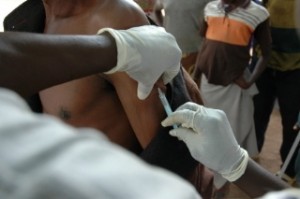June 2012
Work for All Supports: WaterCan
Seven hundred and eighty three million people, or roughly 11% of the world’s population, do not have access to safe water. Two point five billion people, or about 35% of the world’s population, do not have access to adequate sanitation. 1 Around 700,000 children die every year from diarrhea caused by unsafe water and poor sanitation, meaning almost 2,000 children parish each day, unnecessarily.
Michael Lubb0ck started WaterCan because he believed that clean water is the foundation of health, and therefore, of development. WaterCan has been extensively researched and we, at Work for All, are happy to get involved and contribute to some of their projects. WaterCan is a Canadian charity that has been helping the world’s poorest gain access to clean water, basic sanitation and hygiene education since 1987. In the last 25 years, WaterCan has reached over 1.2 million people trapped in poverty through:
– Long term, sustainable development initiatives
– The use of low-cost, locally appropriate technologies
– Integrated water supply, sanitation and hygiene education
– Emphasizing community ownership of planning and development
– Promoting self-help and community participation
All projects are collaborative efforts that involve input from WaterCan staff, African country advisors, indigenous NGO’s and community members. Every community is different and this partnership approach has approach has proven highly successful.
Work for All is proud to support WaterCan in helping to make clean water accessible to all.
SAFE TRANSPORTATION PLAYS KEY ROLE IN PROVIDING SERVICES
I recently read that some young girls were battered and raped as they attempted to make their way to school in Kenya. Now, students attending the school have to board there, because the journey to the school is still unsafe. Other girls that cannot board at the school miss their education entirely. This tragedy identifies the importance of public safety in eliminating poverty. If children cannot get to and from school safely, it doesn’t matter how many schools we build.
Building schools to educate a population is a vital step in creating opportunity. Adult illiteracy means that the poor have severe restrictions on their access to knowledge, information and the press. Not to mention restrictions on basic democratic rights, such as political participation.
In Kenya, many rural communities have opened up makeshift hospitals. I learned of one hospital that is run mostly by a few locals. These people have dedicated their lives to helping people who cannot afford to travel to the NGO funded hospital in the bigger town. The lineup of people, painstakingly, making the trek to the larger hospital is staggering, but there are many others who simply cannot make the journey.
Every day, the rural hospital saves the lives of people who are too sick or too poor to get to the NGO hospital. Building hospitals is great, but, if people have no affordable transportation to get to the hospital, then it doesn’t matter how many hospitals we build.
These two examples show that, although education and health care are vital to any society; reliable, safe transportation must be one of the primary considerations. – ML


